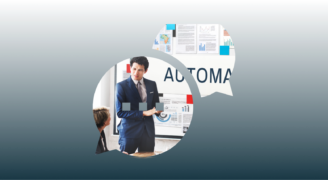ERP software solutions are gaining acceptance among enterprises of all sizes due to their unified approach to business processes. It allows you to gather, store, manage and evaluate data from a variety of business units. Similarly, ERP is utilized to improve cross-departmental workflows and automate back-office activities. When properly optimized, the solution can boost efficiency, cut expenses, and boost profits.
Because ERP influences processes across the organization, establishing a business case for an ERP system, evaluating ERP features and advantages, and selecting the best ERP provider for your firm are all key steps before making a purchase decision.
What is Enterprise Resource Planning (ERP) Software?
ERP software is a set of applications that controls core business functions such as accounting, purchasing, human resources, sales, CRM, customer support, and inventory. Rather than individual software tailored to various corporate operations, it's an integrated system.
What Are the Advantages of Investing in an ERP System?
The majority of possible benefits fall into three categories: direct and indirect cost savings, revenue opportunities, and increased company effectiveness.
Top Reasons to Buy ERP
Companies frequently select ERP because:
1. Their current systems make it difficult, if not impossible, to figure out operations in a straightforward or timely manner. Consider accounting software that lacks the ability to handle multi-entity accounting or connect to the company's inventory management system.
2. As the company grows, it will be important to implement a system that involves less manual labor, so that team members may spend less time.
3 Key Advantages of ERP Systems
1. Direct and Indirect Cost Savings
ERP systems reduce costs in a variety of ways. They can assist with the simplification and automation of complex corporate processes, saving hours of human labor. Also, remove non-value-added processes and unify activities across the organization, allowing staff to be more educated and adaptable.
They can assist in enhancing the quality and decreasing waste by supporting standardized, repeatable procedures. They reduce the number of technology vendor relationships you need to manage by replacing many software systems with a single one, which can save you money on license charges, integration needs, application administration, and the need to train people on multiple processes.
Choosing a cloud-based software-as-a-service (SaaS) ERP system, in which the service provider maintains infrastructure, performance, uptime, and upgrades minimizes IT duties even more.
2. Opportunities to Increase Revenue
ERP systems can help businesses increase sales by ensuring that the proper amount of inventory is on hand to satisfy consumer demand and by providing continuously improved customer service. ERP enables your staff to respond to client inquiries more quickly, achieve higher-order accuracy and on-time delivery rates, and provide more self-service alternatives so customers may buy from you whenever they're ready.
An ERP system can also assist a company in identifying its most profitable products, improving cash flow, and forecasting demand by providing a consolidated database for all financial data.
3. Greater Business Effectiveness
Today's ERP systems help businesses run more efficiently by facilitating and speeding up communication, incorporating best practices and automation into processes, and giving real-time data on corporate performance across teams. They enhance strategic and tactical decision-making by assisting managers in identifying emerging trends and opportunities. ERP solutions should provide a framework for growth and change once they've been established, allowing you to introduce new products or enter new markets more rapidly and easily.
ERP systems today help businesses run more efficiently by facilitating and speeding up communication, incorporating best practices and automation into processes, and giving real-time data on corporate performance across teams. They enhance strategic and tactical decision-making by assisting managers in identifying emerging trends and opportunities. Instead of manually integrating data from a variety of sources with varying ages and levels of accuracy, teams with ERP in place may share the same data. ERP solutions should provide a framework for growth and change once they have been established, allowing you to swiftly and easily introduce new products or enter new markets.
Common Features
Modularity is a feature of several ERP systems. This enables you to begin with essential capabilities and extend as needed, or to select particular modules related to your sector or business features.
Most ERP systems include financial planning, production management, procurement and supply chain control, ordering, accounting, fulfillment tools, and customer relationship management and capabilities in addition to their basic database. Professional services automation, eCommerce, and human resources management are some of the most extensive options. Analytics and process integration and automation, business intelligence capabilities and dashboards are all features that ERP systems can include to provide managers more access and control.
What to Look for When Selecting an ERP System
Start by defining your goals and expectations, as you would with any major business decision, and include key stakeholders who stand to benefit the most from a successful implementation.
Define Your Business Requirements: The initial measure in choosing the right ERP system is to assess your business operations and plan your anticipations on ERP implementation. Decide on how the ERP system can help you change your operations and increase your business by identifying bottlenecks and pain points in your current system.
Outline a Budget and Time Scale: Have a firm grasp on how much you can afford to spend on an ERP system, as well as a timeline for when you want your ERP solution to go live. Depending on the size of the firm, the number of locations, and the level of customization required, ERP implementations can take months to years. When creating a budget, keep in mind the potential hidden costs, such as maintenance, required resources, training fees, hardware in the case of an on-premise deployment, and other utilities.
Customization: Before choosing an ERP system you should have an idea regarding how much may the system be tailored to my specific requirements? Where do I require adaptations, and where can I rely on modules, reports, or other resources created expressly for my industry by the provider? Is my provider aware of the aspects of my procedures and requirements that are actually unique?
Usability: A successful ERP implementation relies heavily on user adoption. Determine how user-friendly and intuitive the application is in a range of jobs.
New Technologies Should Be Adapted by Your ERP System: Every day, new technological advances make every aspect of our lives easier. Your ERP system must work with both current and future technology.
Updates and maintenance: Need a clear picture of how you will modify the ERP system after it's been implemented? What is the procedure for implementing new characteristics, adjusting the amount of users, modifying latest reports, and making other modifications? What changes are you able to make, such as creating new reports and queries? Which tasks will necessitate the assistance of the supplier, or a specialist consultant?
Choose the Right Implementation Partner: You may wish to enlist the assistance of reputable managed service providers to assist you with the ERP deployment process. These firms will supply your company with qualified staff to assist you in getting started with your ERP software.
Are you ready to implement NetSuite ERP Software in your company? Jobin & Jismi can assist you with NetSuite related concerns. We provide comprehensive support for the ERP solution's integration and development.



